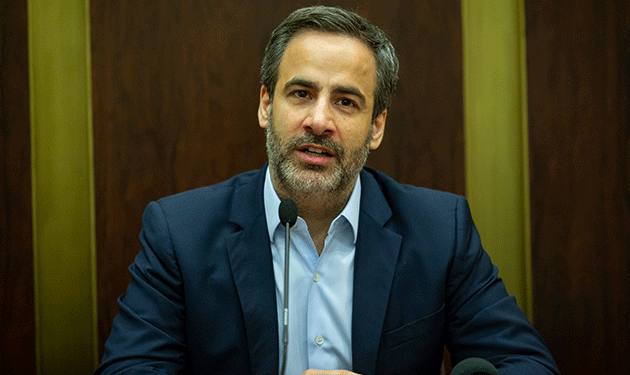Independence Movement President and resigned MP Michel Moawad affirmed that Lebanon is witnessing an economic and social collapse compounded by a lack of public trust in the state’s institutions, which is causing civil unrest. He called for the adoption of electronic voting in parliament in order to arrive at a more transparent voting process and so that the public has a clearer idea of what goes on behind the scenes. Moawad said: “Would there be a problem if we amended the constitution so that we have a more transparent voting process in parliament?”
In a press conference from parliament, Moawad offered his condolences to the martyr Fawaz Al-Samman, who passed away during the recent events in Tripoli, wishing a speedy recovery for all the wounded. He said: “While I understand the people’s pain, anger, and despair, the solution does not lie in taking down the entire structure. By doing that, things will go from bad to worse”. He added: “We want to reform the state, not destroy it, and if civil unrest continues at this rate, we will witness more destruction and chaos.”
Moawad went on to say: “The way the Lebanese state is being run has led us to the miserable situation we find ourselves in. The culture of impunity, corruption and theft have become commonplace, and we need to address those problems first before changing anything else.”
He also pointed out that what happened during the UNESCO sessions has had a negative effect on public opinion, stressing that the current mechanism and process of parliamentary discussions need to change to allow for more accountability. He added: “Regarding parliamentary discussions, why aren’t they made public? I understand that some might have reservations about this, as it might shape parliamentary discussions solely to appease the public, but last week’s lack of publicity during the discussions created a lot of ambiguity and empower populism.”
Moawad stressed that the expedited approval of the law of Accountability of Ministers and Presidents, which has not been approved yet, doesn’t mean that the law has been rejected. On the contrary, the delay in approving it stems from the belief that the implementation of the law needs to take place incorrupt environment. He said: “From my side, I have voted for the law and proposed mechanisms for its implementation.
He went on to discuss the process through which laws are being approved in the parliament, saying: “It has come to my attention that laws are being approved in parliament without deputies being familiar with the details, as happened during the last parliamentary session, “pointing out that that amnesty law would have been approved in this manner had it not been for an opposition that prevented this from happening.
In conclusion, Moawad reiterated his conviction that fundamental reforms must be carried out within the framework of 4 guiding principles. Making parliamentary votes and discussions open to the general public, introducing an accountability culture to parliament, and making the process of approving laws transparent are the fundamental changes needed to restore the public’s confidence in the parliament. He said: “We are in the midst of a battle that requires collective cooperation to get out of this crisis in which we find ourselves in.”







 العربية
العربية